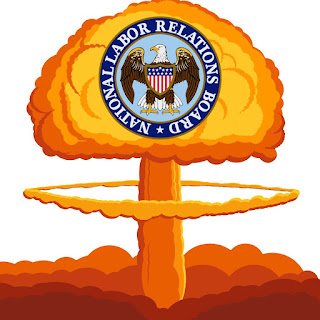NLRB General Counsel Jennifer Abruzzo just released her Guidance in Response to Inquiries about the McLaren Macomb Decision.
Recall that McLaren Macomb held that garden-variety non-disparagement and confidentiality clauses in workplace severance agreements violate the National Labor Relations Act by unlawfully infringing upon the rights of employees to engage in protected concerted activity.
Just how far does Ms. Abruzzo push the limits of McLaren Macomb in her interpretation?
THIS far.
- Not only is McLaren Macomb retroactive to severance agreements signed prior to the opinion's 2/21/23 date, but it might even apply further back than the NLRA's six-month statute of limitations because the enforcement of an illegal agreement might constitute a "continuing violation."
- Employers should consider remedying past violations by contacting employees subject to severance agreements with overly broad provisions and advising them that the provisions are null and void and that they will not seek to enforce the agreements or pursue any penalties, monetary or otherwise, for breaches of those unlawful provisions.
- The logic of McLaren Macomb could also apply to invalidate non-compete clauses, no solicitation clauses, no poaching clauses, broad liability releases and covenants not to sue that may go beyond the employer and/or may go beyond employment claims, and post-employment cooperation requirements.
- A savings clause or disclaimer might save an otherwise unlawful non-disparagement or confidentiality clause, but only if its specifically spells out all of the rights an employee has under the NLRA that could potentially be chilled by the language.
- The employer's motive in proffering the severance agreement is irrelevant; if a provision is unlawful, it's unlawful, no matter how innocent or magnanimous the employer might be.
- Employers can violate the Act merely be giving an unlawful severance agreement to an employee; it's irrelevant whether the employee signs it or otherwise agrees to its terms.
- While the NLRA doesn't cover "supervisors," McLaren Macomb might, if the employer is retaliating against a supervisor for their refusing to commit an unfair labor practice.
- Because employees can't waive rights under the NLRA, an employee cannot request that a severance agreement contain an illegal non-disparagement or confidentiality clause.
- McLaren Macomb might also apply to other employer communications with employees, such as pre-employment offer letters.
- The only confidentiality clause that might be legal under McLaren Macomb is one that is narrowly-tailored to restrict the dissemination of proprietary or trade secret information for a period of time based on legitimate business justifications.
- The only non-disparagement clause that might be legal under McLaren Macomb is one that is narrowly-tailored to unlawfully defamatory statements.
That sound you hear is the sound of the jaw of every single management-side labor and employment lawyer hitting the floor (mine included). Now we all have to figure out just how we're going to draft severance agreements moving forward … and apparently backward.

